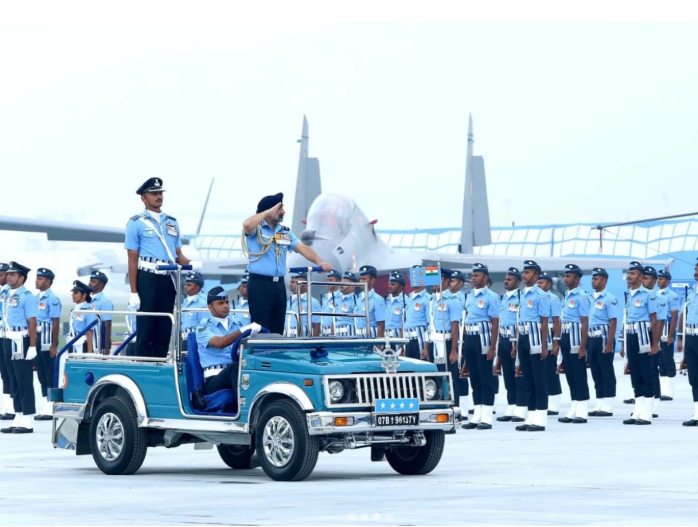Uttar Pradesh Switch to Hindi
Mailani-Nanpara Rail Track Declared Heritage Route
Why in News?
The 171km Mailani-Nanpara metre gauge railway line, passing through the Dudhwa National Park, Uttar Pradesh, has been declared a heritage route by Indian Railways.
Key Points
- About: The Mailani-Nanpara metre gauge railway line was built over 130 years ago by the British in several phases and features 16 stations, 71 bridges, and unique dual-gauge stations at Mailani and Nanpara.
- First Preserved Meter-Gauge Line: Mailani-Dudhwa is the first meter-gauge line in the North Eastern Railway(NER) to be preserved, maintaining its narrow gauge instead of converting it to broad gauge.
- Sustainable Tourism Model: NER plans to preserve traditional railway equipment at key stations like Mailani and Dudhwa, while also maintaining metre-gauge diesel engines at dedicated facilities.
- Heritage Tourism Launch: The heritage tourism initiative started in 2022 with the launch of the Mailani-Bichia AC tourist coach, inaugurated by Railway Minister Ashwini Vaishnaw.
- The new heritage designation is expected to boost eco-tourism, improve regional connectivity, and support local livelihoods.
- Other Key Developments:
- With the opening of the Lakhimpur-Mailani broad gauge section, extending to Pilibhit, Mailani Junction now serves as a critical link between heritage and modern railway infrastructure.
- The Bahraich to Nepalganj Road section via Nanpara Junction was also recently commissioned as a fully electric broad-gauge track, further enhancing regional connectivity.
- In April 2025, a special heritage AC tourist train operated from Mailani to Dudhwa as part of the “Station Mahotsav” celebrations, commemorating 140 years of Gorakhpur Junction.
Dudhwa National Park
- Establishment: Dudhwa National Park, situated in Lakhimpur Kheri district of Uttar Pradesh along the Indo–Nepal border, was established in 1977 as a protected area covering 490 sq. km.
- To protect the swamp deer (barasingha) population from extinction, the Government of Uttar Pradesh declared the area a wildlife sanctuary in 1958.
- The sanctuary was upgraded to national park status in 1977, with additional areas incorporated to strengthen wildlife protection measures.
- The park was also declared a tiger reserve in 1987, as the area was found to have a significant population of Bengal tigers.
- Biodiversity: The park hosts a rich diversity of fauna, including Bengal tigers, leopards, elephants, sloth bears, Indian rhinoceros, and over 450 bird species. Its ecosystem includes grasslands, swamps, and dense sal forests typical of the Terai region.
- Conservation: Major initiatives include habitat restoration and reintroduction of endangered species like swamp deer and barasingha.
- Eco-tourism programs have been developed to promote sustainable tourism and support the local economy while conserving the park’s biodiversity.
National Current Affairs Switch to Hindi
World Habitat Day
Why in News?
The Ministry of Housing and Urban Affairs (MoHUA) celebrated World Habitat Day 2025 at Vigyan Bhawan, New Delhi, with the theme "Urban Solutions to Crisis."
- The event highlighted the importance of making cities more resilient, inclusive, and sustainable in addressing challenges like climate change, migration, and rapid urbanisation.
Key Points
- Background: In 1985, the United Nations designated the first Monday of October each year as World Habitat Day. World Habitat Day was first celebrated in 1986, with the theme "Shelter is My Right", and Nairobi was the host city.
- Objective: This day serves to reflect on the state of our habitats and emphasises the fundamental right of all individuals to have access to adequate shelter.
- Theme 2025: The theme for World Habitat Day 2025, observed on 6th October, is ‘Urban Crises Response,’ focusing on addressing various crises, such as climate change and conflicts, that contribute to inequality in urban areas, while promoting effective crisis response tools and approaches.
Scroll of Honour Award
- Launched by the United Nations Human Settlements Programme in 1989, the UN-Habitat Scroll of Honour Award is the most prestigious global recognition for human settlements.
- This award acknowledges exceptional contributions in areas such as:
- Shelter provision (adequate, affordable housing).
- Highlighting the plight of the homeless.
- Leadership in post-conflict reconstruction.
- Improving urban life quality and human settlements.
National Current Affairs Switch to Hindi
93rd Air Force Day
Why in News?
The Air Chief Marshal Amar Preet Singh conveyed his greetings to the nation on the 93rd Air Force Day, honouring the brave air warriors who have protected the nation's skies with sacrifice, dedication, and professionalism.
Key Points
- About: Celebrated annually on 8th October to honour the establishment of the Indian Air Force (IAF) on 8th October 1932.
- Early Years: The IAF's first operational flight took place on 1st April 1933, beginning a vision of air power that has shaped India’s defence over the decades.
- From a small force with limited personnel and aircraft, the IAF has grown to become the world’s fourth-largest air force, involved in various military and humanitarian missions.
- Motto: The motto of IAF is Touch the sky with Glory (Nabhah Sparsam Diptam), which has been taken from the eleventh chapter of the Bhagavad Gita.
- Theme: The 2025 theme is centred on the force's contribution to Operation Sindoor.
- 2025 Celebrations: This year's celebrations featured a farewell to the iconic MiG-21, a grand flypast with Rafale, Su-30MKI, C-17 Globemaster, Apache Guardian, and others, along with parades, air shows, and exhibitions showcasing the IAF's technological advancements and operational readiness.
- The parade took place at Hindon Air Base, Uttar Pradesh, showcasing technological advancements and operational readiness.
- The restored Hindustan Trainer-2 (HT-2) aircraft, the first indigenously built IAF aircraft, was also displayed for the first time as part of the Heritage Flight.
- The traditional flypast and aerial display are scheduled to be held in Guwahati on 9th November, marking the culmination of this year’s Air Force Day celebrations.





 PCS Parikshan
PCS Parikshan


